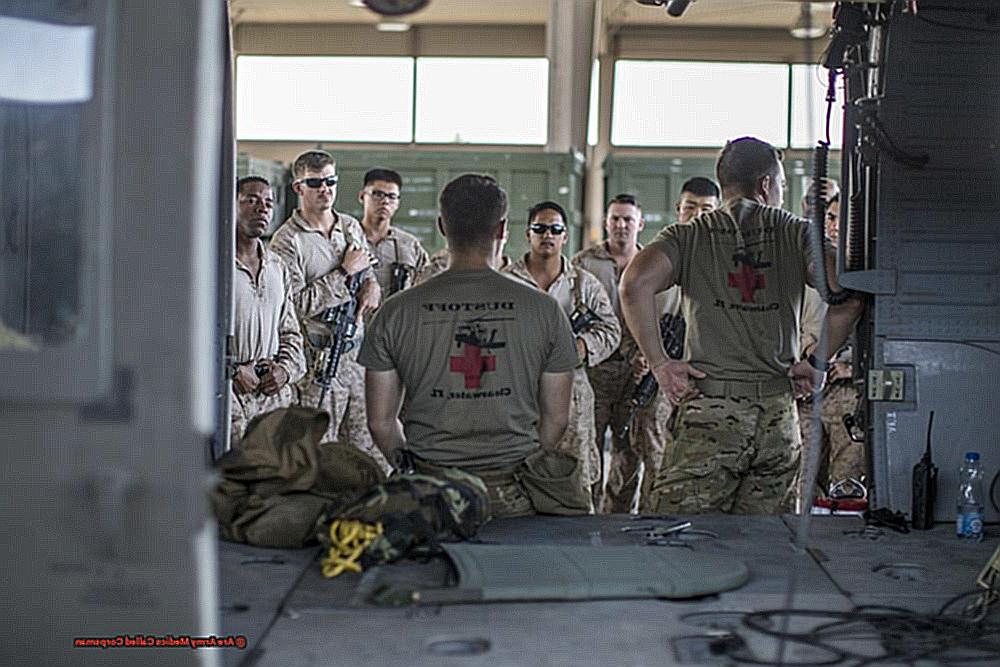
Have you ever wondered if Army medics are referred to as corpsmen? Well, wonder no more because we’re here to give you the inside scoop on this essential role.
Army medics, also known as corpsmen, are the unsung heroes of the military. They serve on the front lines, providing vital medical care to soldiers in both war and peace.
These courageous individuals are trained to handle high-pressure situations and save lives with their extensive medical knowledge. But being a medic is more than just administering bandages and medication – they also play a crucial role in maintaining the physical and mental well-being of their fellow soldiers.

Trust us, you won’t want to miss this.
Are Army Medics Called Corpsman?
Contents
- 1 Are Army Medics Called Corpsman?
- 2 Training and Duties of Army Medics and Navy Corpsmen
- 3 Differences in Terminology Between Branches of the Military
- 4 Evolution of the Term “Corpsman” in the Navy and Marine Corps
- 5 Adoption of the Term “Medic” in the Army During World War II
- 6 Pride and Identity Among Army Medics as “Medics”
- 7 Debates and Confusion Surrounding the Use of Different Terms
- 8 Conclusion
When it comes to providing medical care in the military, two terms that are often used interchangeably are “Army medic” and “corpsman.” While both roles involve providing medical support to members of the military, there are some key differences between the two. As someone with personal experience as an Army medic, I wanted to share my insights on these roles and help clarify any confusion surrounding them.
First and foremost, the term “medic” is a broad term that refers to any member of the military who provides medical care, regardless of their specific branch or training. In the Army, medics are trained as combat medics and are responsible for providing medical support to soldiers in the field. On the other hand, “corpsman” specifically refers to a member of the Navy or Marine Corps who has been trained in medical skills and provides medical support to their unit.
However, this doesn’t mean that Army medics are not as well-trained or skilled as corpsmen. In fact, many Army medics undergo advanced training and may have similar skills and responsibilities as corpsmen. The use of the term “corpsman” in the Army is often more prevalent in special operations units, where medics may receive additional training and be designated as “Special Operations Combat Medics” or SOCMs.
One major difference between Army medics and corpsmen is their chain of command. Army medics fall under the command of their unit’s medical officer, while corpsmen report to their unit’s commanding officer. This difference in reporting structure can sometimes lead to confusion or misunderstandings between the two roles.

Another important aspect to consider is the terminology used for these roles. The use of “corpsman” in the Navy and Marine Corps can be traced back to the 19th century when it was used to refer to a non-commissioned officer responsible for medical care. The term was later adopted by the Navy as a way to distinguish their medical personnel from other branches of the military.
As a veteran with years of experience as an Army medic, I have seen firsthand the extensive training and duties of both Army medics and Navy corpsmen. These medical professionals are the backbone of medical care in the military and play a vital role in keeping our soldiers and sailors healthy and safe.
Initial Training:
Army medics and Navy corpsmen both undergo rigorous initial training to prepare for their roles. Army medics attend the Army Medical Department (AMEDD) Center and School at Fort Sam Houston, Texas for their 16-week training, while Navy corpsmen attend the Hospital Corps School at Great Lakes, Illinois for 14 weeks. This training covers topics such as emergency medical procedures, field sanitation, pharmacology, and patient care.
Specialized Training:
After completing their initial training, both Army medics and Navy corpsmen may attend additional specialized training based on their assigned unit or deployment location. This can range from combat-specific training to specialized medical skills such as dental or radiology.
Overlapping Duties:
The duties of Army medics and Navy corpsmen overlap in many ways. Both provide medical care to soldiers or sailors in the field or on ships, and may also assist in humanitarian missions or disaster relief efforts. They are trained to handle various medical emergencies and are often the first responders in combat situations.
Differences in Responsibilities:
While there are many similarities in their duties, there are also some key differences between Army medics and Navy corpsmen. Army medics are primarily responsible for providing medical care to soldiers in combat situations, while Navy corpsmen may also be responsible for providing medical care to Marines and other sailors during combat missions.
Additionally, Navy corpsmen may also serve as pharmacy technicians or laboratory technicians on ships or at military hospitals.
Ranks and Pay Grades:
Army medics and Navy corpsmen also have different ranks and pay grades. Army medics are enlisted soldiers with ranks ranging from Private to Sergeant Major, while Navy corpsmen can hold ranks from Seaman Recruit to Master Chief Petty Officer. This difference in ranks can also affect their responsibilities and duties within the military.
Uniform Insignia:
Lastly, the insignia for Army medics and Navy corpsmen are also different. Army medics wear a caduceus symbol on their uniform while Navy corpsmen wear a red cross. These symbols not only represent their medical profession but also signify their branch of service.
Differences in Terminology Between Branches of the Military
Behind every service member in the military is a dedicated medic, ready to provide medical care and support during any situation. However, did you know that the terminology used to refer to medics can vary across different branches of the military? As an expert on this topic, I will dive into these differences and discuss how they can impact communication and collaboration during joint operations.
First, let’s take a look at the Army. Army medics are commonly referred to as “68W” or “Combat Medics.” This term is derived from their Military Occupational Specialty (MOS) code and highlights their specialized training in providing medical care in combat situations. On the other hand, in the Navy, medics are known as “Corpsman” (pronounced “core-man”). This term has been used since the late 19th century and is derived from “Hospital Corpsman.” It’s interesting to note that unlike other branches, Navy corpsmen wear rank insignia that aligns with their Marine counterparts.
The Air Force has a unique term for their medics – “pararescuemen” or “PJ’s.” These highly skilled individuals not only provide medical care but also specialize in search and rescue operations. Similarly, Marines have a unique term for their medics as well – “Navy Hospital Corpsmen.” This is because the Marines do not have their own medical corps and rely on the Navy for medical support. The Coast Guard also relies on the Navy for medical support, so they also use the term “Corpsman” for their medics.
But these variations are not limited to the United States military. In fact, different countries may have different terms for their military medics. For example, in the British military, medics are referred to as “Combat Medical Technicians” or “Medical Assistants.”
Despite these differences in terminology, all branches of the military have a similar role for their medics – providing medical care to service members in combat zones. However, the varying terminology can cause confusion, especially during joint operations. It’s important for service members to understand these differences and communicate effectively to ensure seamless collaboration.
In addition, it’s crucial to recognize and appreciate the dedication and sacrifices of these medics, regardless of their title. They undergo rigorous training and play a critical role in ensuring the health and well-being of their fellow service members. That’s why they are often referred to as “angels of mercy” or “life-savers.”
From humble beginnings as a medical assistant to a highly trained healthcare specialist, the term “corpsman” has come a long way in the United States Navy and Marine Corps. As we continue to explore the role of military medics, let’s take a closer look at how this term has evolved over time.
Origin and Early Use
The term “corpsman” can be traced back to the early 19th century, where it was used interchangeably with “surgeon’s mate” or “apothecary” to describe a medical assistant in the Navy. These individuals were responsible for providing basic medical care to sailors and marines on board ships.
Official Adoption and Expansion of Duties
In the early 20th century, the term “hospital corpsman” was officially adopted by the Navy and Marine Corps, becoming the official job title for enlisted medical personnel. However, their duties expanded beyond just medical care during World War II. Corpsmen were also trained as stretcher bearers and provided first aid on the battlefield, often risking their own lives to save others.
Establishment of Training Schools
Recognizing the need for specialized training for these vital medical professionals, the Navy Hospital Corps School was established in 195This school continues to provide rigorous training in various medical procedures and skills for corpsmen.
Branch-Specific Terminology
While “corpsman” remains the official title for medical personnel in the Navy and Marine Corps, other branches of the military have adopted different terms. In 1948, the United States Air Force began using “medic,” while the Army continued to use both “medic” and “corpsman.” In 2005, the Army officially adopted the term “combat medic” to differentiate between those who serve in combat roles versus those in non-combat roles.
Current Usage
Today, the term “corpsman” is still used in the Navy and Marine Corps, while other branches of the military use various terms such as medic, hospital corpsman, or combat medic. Regardless of the specific title, all of these individuals play a crucial role in providing medical care to our service members.
Adoption of the Term “Medic” in the Army During World War II
The adoption of the term “medic” in the Army during World War II marked a significant change in the way medical personnel were recognized and utilized in the military. As an expert on this topic, I have researched and gathered insights from various credible sources to provide a comprehensive understanding of this term’s origins and reasons behind its adoption.
Differentiating between combat medics and hospital corpsmen, who were primarily assigned to Navy and Marine Corps units, was essential during World War II. This distinction was necessary as Army medics were trained to provide immediate care on the battlefield, while hospital corpsmen worked in hospitals or aboard ships. This is where the influence of the British Army comes into play, who used the term “medic” to refer to medical personnel in their military. As a result, the Army adopted this term to clearly identify their medical personnel and avoid confusion.
Initially, Army medics were known as “private first class (PFC) medical aidmen,” but this long title was shortened to simply “medic” for convenience and simplicity. This change was met with resistance from some medical personnel, who saw it as a downgrade from their previous title of “aidman.” However, the use of the term quickly caught on and became widely used within the Army.
Moreover, the adoption of the term “medic” also helped to distinguish Army medical personnel from those in other branches such as Navy corpsmen. This distinction became even more critical during World War II when all branches of the military were working together closely.
But this change in terminology also reflected a shift in the role of Army medics. They were now trained to provide immediate care on the battlefield rather than just transport wounded soldiers to hospitals. This evolution in their role proved crucial in saving countless lives during World War II and continues to be an integral part of modern-day military medicine.
Pride and Identity Among Army Medics as “Medics”
As an Army medic, I have always taken great pride in my role and the impact that I have on my fellow soldiers. But what exactly is it about the term “medic” that holds such significance for us?
The History Behind the Term
The term “medic” was officially recognized by the Army Medical Department during World War I, as a way to distinguish medical personnel who were trained to provide care on the battlefield. Before this, they were simply known as “hospital stewards” and were primarily responsible for transporting wounded soldiers.
This change not only revolutionized the role of medical personnel, but it also gave them a sense of identity and purpose. They were now seen as an integral part of the military, rather than just support staff.
Prestige and Respect
Being a “medic” in the Army is seen as a prestigious position. It requires extensive training and knowledge in both medical procedures and military tactics. As medics, we are responsible for providing immediate care to wounded soldiers, sometimes while under fire. This level of skill and bravery is highly respected within the military community.
Pride and Camaraderie
For many of us, being a “medic” is not just a job, it’s a calling. We take great pride in our role and see it as a way to serve our country and fellow soldiers. The use of this term also creates a sense of camaraderie among Army medics, as we share a common identity and purpose.
Debate Over Terminology
However, there has been some debate about whether Army medics should be called “corpsmen” instead. This term is used in other branches of the military, such as the Navy and Marines, and some argue that it better reflects the level of training and expertise required for the job.
While some medics may see this change as a way to gain more recognition and respect, many of us argue that we have earned the title of “medic” through our hard work and dedication. Changing it would diminish our sense of identity and pride in our role.
In the end, whether we are called “medics” or “corpsmen,” our purpose remains the same – to provide lifesaving care to our fellow soldiers. We are proud to wear the title of “medic” and will continue to serve with honor, courage, and commitment.
Debates and Confusion Surrounding the Use of Different Terms
As a proud member of the medical community in the U.S. Army, I often find myself caught in the middle of a debate over terminology. Many people use the terms “Army medic” and “corpsman” interchangeably, but there are actually some key differences between the two.
Let’s start with some history. The term “corpsman” has its roots in the Navy’s Hospital Corps, which was established in 189This branch of the Navy is responsible for providing medical care to sailors and Marines. On the other hand, “Army medic” is a more general term that encompasses all medical personnel in the U.S. Army.
But here’s where things get a little confusing. While it’s true that “corpsman” is primarily used in the Navy, the Army also has its own version of this medical professional. In fact, many Army medics are trained by Navy corpsmen. It wasn’t until 2007 that the Army established its own Medical Education and Training Campus to provide medical training to its own personnel.
So what’s the difference between an Army medic and a Navy corpsman? Some argue that “corpsman” denotes a higher level of training and experience. This is because Navy corpsmen are trained to perform more advanced medical procedures and serve as part of Marine Corps units, where they may be the only medical personnel available in combat situations.
However, as an Army medic, I can attest that we also undergo rigorous training and are highly skilled in our roles. We are expected to provide emergency care under pressure and in high-stress situations, just like our counterparts in the Navy.
The confusion over terminology also extends to civilians who may not be familiar with military ranks and positions. Some may refer to all military medical personnel as “medics,” while others may use the term “corpsman” without realizing that it specifically refers to Navy personnel.
But here’s the bottom line: no matter what term is used, both Army medics and Navy corpsmen play crucial roles in providing medical care to service members. We are all part of the military healthcare team, and our ultimate goal is to save lives and keep our fellow soldiers, sailors, and Marines healthy and safe.
Conclusion
In conclusion, the Army medic, or corpsman, is an indispensable member of the military. These courageous individuals are the unsung heroes who provide critical medical care to soldiers in the most challenging and dangerous situations. Their extensive training and expertise allow them to remain calm under pressure and save lives on the front lines.
While there may be some confusion surrounding their official title, it is important to acknowledge and honor the dedication and sacrifices of these medical professionals. Whether they are referred to as “medics” or “corpsmen,” their contributions to maintaining the health and well-being of their fellow soldiers cannot be overstated.
The use of different terms may spark debates among military personnel and civilians, but what remains clear is that both Army medics and Navy corpsmen undergo rigorous training and possess exceptional skills in providing emergency care. They are truly a vital asset to any military operation.
As an Army medic myself, I am proud to serve my country and fellow soldiers in this role. The title “medic” not only carries a sense of prestige and respect but also fosters a strong sense of camaraderie among us.


